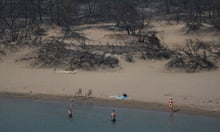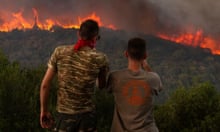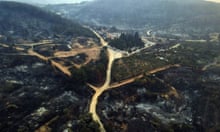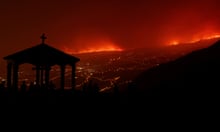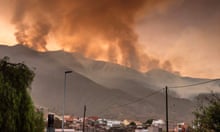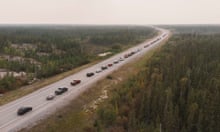Firefighters in Portugal, Spain, France, Greece and Morocco are battling forest fires raging across tens of thousands of hectares as this week’s heatwave continues to bring extreme temperatures and cause hundreds of deaths across south-western Europe.
The second heatwave of the summer – with temperatures hitting 47C (116F) in Portugal and 45C in Spain – has triggered wildfires that have forced the evacuation of thousands of people.
In Portugal, the meteorological institute has forecast temperatures of up to 42C, with no respite before next week. The civil defence authorities, however, took advantage of a slight drop in temperatures after a July record of 47C on Thursday to try to stamp out one remaining major fire in the north of the country.
“The risk of fires remains very high,” the civil defence chief, Andre Fernandes, said, although media reports said the number of active mainland fires was down to 11 from 20 earlier.
“This is a weekend of extreme vigilance,” he added after a week in which two people were killed and more than 60 injured, and up to 15,000 hectares of forest and brushwood incinerated.
A total of 39,550 hectares (98,000 acres) was ravaged by wildfires between the start of the year and mid-June, more than triple the area in the same period last year, data from the Institute for the Conservation of Nature and Forests showed.
The Lisbon government was to decide on Sunday whether to extend a week-long state of contingency. Portugal’s health ministry said 238 people had died as a result of the heatwave from 7-13 July, most of them elderly people with underlying conditions.
In Spain, the state meteorological agency maintained various levels of alert across the country, warning of temperatures of up to 44C in some regions.
More than 600 members of Spain’s military emergency unit have been helping firefighters and wildlife rangers tackle dozens of forest fires across the country, where blazes have so far torn through at least 14,000 hectares.
One fire in the south led the authorities to cordon off a section of a key highway connecting Madrid to the Portuguese capital, Lisbon, for more than 12 hours. Another blaze near the southern city of Málaga forced the preventive evacuation of more than 3,000 people, rescue services said.
The fires have scorched thousands of hectares in the south-western Spanish region of Extremadura, where one fire was started on purpose, according to Pedro Muñoz, head of forest policy for the regional government. He said the blaze that broke out in the Valle del Jerte on Saturday night had “clearly been started deliberately” as it had begun at 11pm and originated in two different places.
Another fire has destroyed 200 hectares of Extremadura’s Monfragüe national park, which is known for its biodiversity and rich bird life.
A 60-year-old street sweeper died after developing heatstroke while working in Madrid on Friday afternoon, prompting the city council to announce flexible working hours so that municipal employees can avoid the hottest periods of the day.
Figures from Spain’s Carlos III public health institute show there were 360 deaths attributable to the heat between last Sunday and Friday, 123 of whom died on Friday alone.
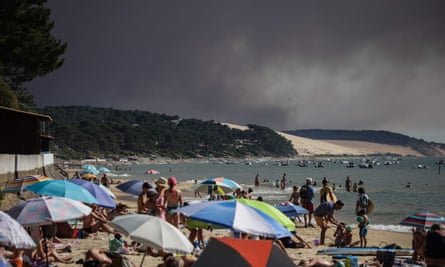
Firefighters in the coastal town of Arcachon in France’s south-western Gironde region were fighting to control two forest blazes that have destroyed more than 10,000 hectares (24,700 acres) this week.
“It’s a herculean job,” said Lt Col Olivier Chavatte of the fire and rescue service, which has 1,200 firefighters and five planes in action.
Since Tuesday, more than 14,000 people in France – residents and tourists – have been forced to flee, and seven emergency shelters have been set up to receive evacuees.
The French government has stepped up efforts to protect people in nursing homes, the homeless and other vulnerable populations after a vicious heatwave and poor planning led to nearly 15,000 deaths in 2003, especially among elderly people.
On Sunday afternoon, the Gironde regional government said the situation remained “very unfavourable” because of gusting winds that had helped fan more flare-ups overnight.
Emergency officials also warned that high temperatures and winds on Sunday and Monday would complicate efforts to stop the fires from spreading.
“We have to stay very prudent and very humble, because the day will be very hot,” regional fire official Eric Florensan told radio France-Bleu on Sunday. “We have no favourable weather window.”
Authorities in the French Alps urged climbers bound for Mont Blanc, Europe’s highest mountain, to postpone their trip due to repeated rock falls caused by “exceptional climatic conditions” and drought.
The call came after a section of Italy’s biggest Alpine glacier gave way at the start of the month, killing 11 people, a disaster that officials blamed on climate heating.
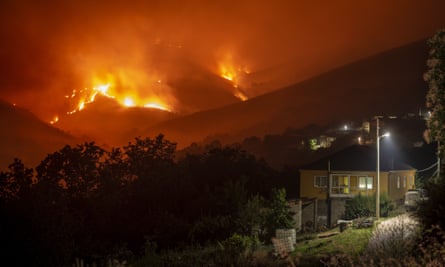
In Greece, the civil defence rushed to douse flames raging on the Mediterranean island of Crete, while Morocco was battling a forest fire in its northern mountains that killed at least one person and forced the evacuation of more than 1,000 families.
The fight against the flames has claimed the lives of a number of personnel, from a pilot killed when his plane crashed in northern Portugal to two who died in Greece when their helicopter fell into the sea.
The fires have been fanned by extreme temperatures that experts attribute to the climate crisis. Croatia and Hungary have also had wildfires this week, as has the US state of California.
Government ministers in the UK held an emergency Cobra meeting on Saturday after the meteorological agency issued a first-ever red warning for extreme heat, cautioning that there is a “risk to life”.
The Met Office said temperatures in southern England could exceed 40C on Monday or Tuesday for the first time, leading some schools to say they will stay closed next week.
The London mayor, Sadiq Khan, advised Londoners to use public transport only if absolutely necessary. National rail operators also warned passengers to avoid travelling on trains.
Four people who had been helping firefighters tackle a wildfire in the US state of New Mexico died late on Saturday when the sheriff’s department helicopter they were travelling in crashed.
Agence France-Presse, Reuters and the Associated Press contributed to this report
